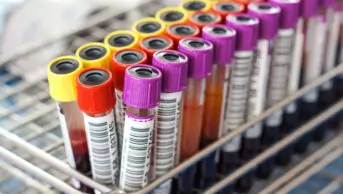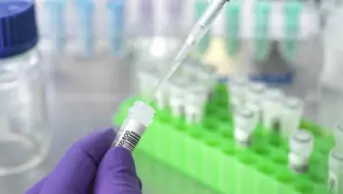
Shutterstock.com
A rapid genetic point-of-care test that can be used to avoid hearing loss in newborn babies treated with the antibiotic gentamicin is being rolled out across neonatal units in a Manchester NHS trust.
The ‘Genedrive’ swab test, which can be carried out at the bedside and takes just 25 minutes, can determine if newborns admitted to the intensive care unit (ICU) carry a genetic variant that could result in permanent hearing loss if they are treated with gentamicin, one of the usual antibiotics given in hospital for suspected infection in this age group.
The test costs £80 per baby and is backed by £900,000 funding from the National Institute for Health Research and support from the charity Royal National Institute for Deaf People.
According to a press release, published by NHS England on 2 April 2022, severely ill newborns admitted to ICU are usually given gentamicin within 60 minutes.
However, although gentamicin is used to safely treat about 100,000 babies in England each year, 1 in 500 babies carry the genetic variant that can make the antibiotic cause permanent hearing loss.
As a result, it is thought that the point-of-care test could save the hearing of 180 babies in England each year, while saving the NHS £5m annually by reducing the need for other interventions, such as cochlear implants.
The test was developed by a start-up based at the University of Manchester in close collaboration with the Manchester Biomedical Research Centre.
Clinical trials began in 2020 and results published in JAMA Pediatrics in March 2022 showed that the test could be used to guide antibiotic prescribing without disrupting normal clinical practice.
The service will initially be introduced at neonatal units at Manchester University NHS Foundation Trust, but NHS England has stated that the NHS Genomic Medicine Service Alliance and the NHS intend to explore how the technology could be launched as part of a clinical service through the NHS Genomic Medicine Service.
Around 300 nurses are currently being trained to use the test across the Manchester trust.
Bill Newman, a consultant in genomic medicine at the trust, and professor of translational genomic medicine at the University of Manchester, said he was “absolutely thrilled” with the success of the ‘Pharmacogenetics to avoid loss of hearing’ (PALOH) study.
“That this testing is now going to be used in three of our trust’s neonatal intensive care inits — it’s actually going to make a real difference so babies are not going to lose their hearing for a preventable reason,” he said.
“The trial demonstrated that you can deploy rapid genetic testing in a clinical setting, and that the tests can be carried out within the ‘golden hour’, when severely unwell babies should be treated with antibiotics.”
Steve Tomlin, associate chief pharmacist at Great Ormond Street Hospital and professional lead of the Neonatal and Paediatric Pharmacists Group, said that gentamicin had been used for years in the ICU, particularly immediately after birth in many babies admitted to neonatal ICU.
“Its side effects are well known and most are avoided by careful monitoring of renal function and drug levels,” he continued.
“However, ototoxicity is primarily seen as an issue associated with a patient’s genetic profile and thus knowledge of that before administration greatly decreases the chances of this problem.
“The famous lines ‘First do no harm’ are ideal in this situation, but to know you are likely to do harm requires a genetic test prior to use of the gentamicin.”
Tomlin said that, in his institution, they had been doing genetic profiles for gentamicin for several years, but that the antibiotic was often needed urgently and not after several days, which is currently how long the genetic test results take.
“To have a test that can give you the information required almost immediately is fantastic and will allow practice to do what it has been wanting to do for many years,” he added.


